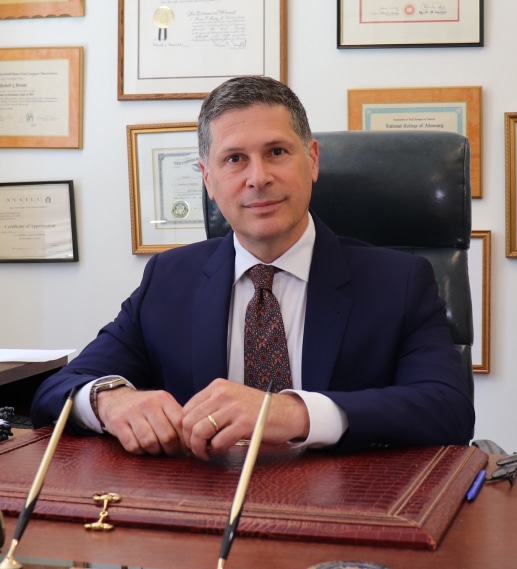Home » New York City Personal Injury Lawyer » New York City Car Accident Lawyer
- Common Injuries in NYC Car Accidents
- What to Do After a New York City Car Accident
- How can Proner & Proner help me with my New York City car accident case?
- What are the most common causes of car accidents in NYC?
- Where do most car accidents occur in NYC?
- Get Advice From An Experienced Motor Vehicle Accident Lawyer
- Car Accident Compensation
- Who is liable for my car accident injuries?
- What do I have to prove in a car accident case?
- What if I am partly at fault for the accident?
- What if my loved one was killed in a car accident?
- When should I contact an attorney?
- How much does it cost to hire a New York car accident attorney?
- Why should I choose Proner & Proner to represent me in my car accident case?
- Frequently Asked Questions About NYC Motor Vehicle Accident Claims
According to Transportation Alternatives, 2021 was the deadliest year for New York City drivers since 2013, with 273 people killed in traffic accidents. Compared to 2018, drivers in 2021 faced twice as many hit-and-run accidents.
The attorneys at Proner & Proner have extensive trial experience and the necessary resources to to be New York City’s most respected car accident lawyers. If you’ve been involved in a car accident and need legal assistance, contact our East 42nd Street office in Manhattan at (212) 986-3030.
Common Injuries in NYC Car Accidents
The forces present during a car accident can result in catastrophic injuries, including but not limited to the following:
- Skull fractures
- Traumatic brain injury
- Spinal cord injuries
- Neck & back injuries
- Burn injuries
- Broken bones
- Internal organ damage
- Loss of limbs
- Wrongful death
What to Do After a New York City Car Accident
The following steps are crucial after a car accident:
- If possible, remove yourself and the vehicle from the roadway to a safe location.
- Do not leave the scene of the accident.
- Call 911 to request an ambulance and a police officer to file a report.
- Document the accident by taking photos, recording videos and writing down what occurred as soon as you can.
- Request the names and contact information of witnesses.
- Exchange information with the other driver without admitting fault.
- File a motorist accident report with the New York Department of Motor Vehicles (DMV).
- Request a copy of the police report and your motor vehicle report by contacting the police precinct where the accident occurred or the DMV if the reports are already filed.
- Contact an attorney as soon as possible.

What Our Clients Say
Here are some of our clients’ testimonial videos
Related Pages
New York Office
122 E. 42nd St #2015, New York, NY 10168
Email: info@prolaw1.com
Phone: (212) 986-3030
Successful Cases
$6,900,000.00
Female, Male: Premises Liability
$3,500,000.00
Female, 43: Premises Liability
$3,500,000.00
Female, 33: Serious Personal Injury
Testimonials
Got into a motorcycle accident and went to Proner&Proner. I received great services and excellent results, I would definitively recommend the services. It was a great experience for me, A++ attorneys.
– GOOGLE REVIEWER / CLIENT
When I felt I needed legal support after a motorcycle accident, I sought out an attorney who was a motorcyclist as well. Fortunately, I found Mr. Proner. The concern I received was a comfort. The firm’s contact with me while working on my behalf was reassuring and the results certainly made a bad experience easier to put behind me. My gratitude to Proner & Proner.
– GOOGLE REVIEWER / CLIENT
Mitchell Proner is an amazing and very experienced trial lawyer, who takes care of his clients. He represented me in a car accident case, kept me very informed during the lengthy legal process and got me the settlement that I expected. His friendly office staff was always willing to assist and answer any questions I had. I recommend Mitchell Proner to all my friends and family!
– GOOGLE REVIEWER / CLIENT
I am very grateful for the services they were very quick and they dealt with my case right away. Thank you very much.
– GOOGLE REVIEWER / CLIENT
Mitchell Proner is an excellent lawyer. He took our case and did the right thing. We recommend him 100% to anyone. His staff are professionals and they care about their clients.
– GOOGLE REVIEWER / CLIENT
Greatest Lawyers I ever had. Answer any and every question I ever had. They treated me as one of the family. I can’t say enough about this firm. Thank you so much for all you guys did.
– GOOGLE REVIEWER / CLIENT
Awesome experience, excellent service, very professional and fast resolving my case. My number one attorney – definitely recommended more than once. Thank you!
– GOOGLE REVIEWER / CLIENT
How can Proner & Proner help me with my New York City car accident case?
What are the most common causes of car accidents in NYC?
The New York Police Department’s statistics for May 2022 show the most common causes of car accidents in New York City as follows:
- Driver inattention/distraction
- Following too closely
- Failure to yield
- Improper lane usage or passing
- Passing too closely
- Unsafe speed
- Disregard of traffic control
- Unsafe backing
- Improper turn
- Unsafe lane changing
- Driver inexperience
- Alcohol involvement

Where do most car accidents occur in NYC?
Transportation Alternatives also reported that the following areas experienced the highest concentration of accidents in 2021:
- Driver inattention/distraction
- Arverne
- Brookville
- Edgemere
- Laurelton
- Springfield Gardens
- Rosedale
- Far Rockaway

Get Advice From An Experienced Car Accident Lawyer
All You Have To Do Is Call 212-986-3030 To Receive Your Free Case Evaluation.
Car Accident Compensation
After a car accident, you may be overwhelmed with medical bills in addition to being unable to work. A car accident lawsuit can help relieve some of this stress. At Proner & Proner, we strive to recover the maximum compensation available on our clients’ behalf.
New York’s No-Fault Insurance Requirements
Every driver in New York City is required to carry no-fault insurance, liability insurance and uninsured motorist coverage. After an accident, you must file a claim with your own no-fault insurance first, also known as Personal Injury Protection (PIP).
PIP provides coverage for basic medical and rehabilitative expenses and up to 80 percent of your lost wages, with a maximum payout of $2,000 monthly. It also provides a death benefit of $2,000.
If you are seriously injured in a car accident, PIP coverage may be insufficient to cover all of your damages. In these cases, you can file a claim against the other driver. Compensation would come from the other driver’s liability insurance, up to the coverage limits. If your damages exceed the coverage limits, you may be able to seek compensation from the negligent party directly if the party has collectible assets.
New York law defines a serious injury as one or more of the following:
- Injury resulting in death
- Dismemberment
- Significant disfigurement
- A fracture
- Loss of a fetus
- Permanent loss of use of bodily functions or limbs
- Temporarily disabling injuries that prevent the victim from performing daily activities for at least 90 days during the first 180 days following the accident
Types of Compensation
Compensation available in cases of severe car accident injuries may include such damages as the following:
- Medical expenses
- Lost wages
- The cost of domestic services
- Pain and suffering
- Disfigurement
- Loss of capacity to enjoy life
- Loss of society
- Punitive damages
Punitive damages are not always available. They are awarded as a punishment against a defendant whose conduct was deliberate, reckless or grossly negligent, such as in the case of a drunk driver.
What if the other driver is uninsured or I am in a hit-and-run accident?
If the other driver is uninsured, you may be able to recover compensation from the driver directly if the driver has collectible assets or substantial income sources. If not, or in the case of a hit-and-run accident, your own uninsured motorist coverage provides benefits that are comparable to the other party’s liability coverage. In some cases, you may also be able to identify other parties who share liability.
How long does it take to recover compensation?
The time required for your case to resolve will depend on a number of factors, including the following:
- The severity of your injuries
- The complexity of your case
- The lawyer you choose
- Whether your case settles or goes to court
Recovering compensation from your no-fault insurance policy is generally a faster process than recovering compensation from the negligent party or your uninsured motorist coverage.
Who is liable for my car accident injuries?
Establishing liability in a car accident case can require forensic accident analysis, and multiple parties could be liable in the same accident. Examples of parties that may be liable include the following:
- The other driver
- The vehicle owner, especially in cases involving commercial vehicles
- Vehicle or parts manufacturer
- City of New York
For example, the city may be responsible for poor road conditions, and vehicle parts manufacturers should be held accountable for faulty tires and defective airbags.
What do I have to prove in a car accident case?
Like all personal injury cases, car accident victims must prove that another party behaved negligently. Negligence occurs when a party fails to act with a level of care that would normally be expected of a reasonable person under the circumstances. To make a case for negligence, you must prove the following four elements:
- Duty: The defendant owed a duty of care.
- Breach: The defendant breached the duty of care.
- Injury: Property damage or bodily harm, whether physical or psychological, has occurred.
- Proximate Cause: The breach of duty, and not something else, caused the injury.
What if I am partly at fault for the accident?
New York’s contributory negligence law allows car accident victims to be compensated for their injuries even if they are partly responsible for the accident. However, the compensation will be diminished accordingly.
If the police or insurance company has assigned fault to you in a car accident, it is important that you do not concede without your attorney’s approval. An experienced personal injury attorney may be able to refute these findings on your behalf.
What if my loved one was killed in a car accident?
In the tragic event that your family member has been killed in a New York City car accident, New York statutes allow a wrongful death claim to be filed on behalf of the estate. This claim must be filed by the personal representative, such as the executor of the estate. Any proceeds will be awarded to the estate and distributed to the immediate family members.
Available wrongful death damages include the following:
- Medical expenses of the deceased
- Funeral and burial expenses
- Pecuniary injuries
- Damages that could have been claimed by the deceased had they survived
- Pain and suffering of the family
- Loss of companionship
- Loss of parental guidance
- Loss of consortium
When should I contact an attorney?
The aftermath of a car accident is stressful, and it may be tempting to put off contacting an attorney. However, a qualified NYC car accident attorney can handle many details for you and relieve some of your pressure. However, you will need to contact the attorney as soon as possible to make this happen.
Early involvement by the attorney ensures that the attorney has access to important evidence before it becomes lost or degraded and also allows your attorney to identify and interview witnesses while the accident is still recent enough for them to recall important details.
The statute of limitations in New York for most car accident cases is three years, except in the case of wrongful death, which reduces the statute of limitations to two years. In either case, a qualified NYC car accident lawyer will need a significant amount of time to investigate and prepare your case before it can be filed. Early involvement will afford the attorney sufficient time to complete these tasks ahead of the deadlines.

How much does it cost to hire a New York car accident attorney?
At Proner & Proner, we do not charge our clients upfront fees. This allows our clients access to the same high level of representation previously only affordable for large companies while incentivizing our law firm to provide the best service possible and recover the maximum compensation available.
Why should I choose Proner & Proner to represent me in my car accident case?
Proner & Proner has a rich history of providing vigorous, skillful advocacy to clients for over 60 years. During that time, we have helped thousands of car accident victims recover substantial compensation for their injuries.
Mitchell Proner approaches every case with empathy and understanding, having himself been injured in a serious motorcycle accident in 1990. As an attorney who knows how it feels, Mitchell Proner makes himself accessible by providing every client with his own cell phone number along with a hardworking team of attorneys, paralegals and staff who maintain regular contact.
Mitchell Proner is regularly invited by national and international television and radio networks such as CNN, the BBC and local news affiliates as a guest legal analyst. He has received numerous prestigious recognitions from his peers, including Super Lawyer, designation by the American Trial Lawyers Association as a Top 100 Trial Lawyer and election as president of the New York State Academy of Trial Lawyers. He also chairs several prestigious legal committees.
Proner & Proner handles all types of motor vehicle accident cases in addition to car accidents, including the following:
- Motorcycle accidents
- Truck accidents
- Bicycle accidents
- Pedestrian accidents
- Bus accidents
- Subway accidents
- Taxi accidents
- Uber accidents
Time is of the essence in car accident injury cases. Contact Proner & Proner today to schedule your free consultation.
Frequently Asked Questions About NYC Motor Vehicle Accident Claims
It depends on the type of accident involved. Potentially responsible parties may include:
– Your own insurance company,
– The at-fault driver,
– A company that owned the other vehicle,
– The public transit authorities,
– A company that manufactured or designed a defective vehicle part,
– A company responsible for maintaining the vehicle that caused the accident,
– A property owner that maintained their property negligently,
– A government entity for negligently maintaining the roads.
Many people in NYC are injured in bike accidents, taxi accidents, bus accidents and other types of road accidents where they weren’t even driving a motor vehicle. You might not even have car insurance. In some cases, such as subway or bus accidents, the public transportation authority may even be responsible for your accident. Timelines might be much shorter for filing a claim than if you were injured in a simple car accident. Commercial insurance policies with higher coverage limits might be involved—which usually means the insurance company will fight even harder to avoid responsibility. Our lawyers can help you understand the specific laws that apply based on the type of motor vehicle accident involved.
Request a copy of the police report and your motor vehicle report by contacting the police precinct where the accident occurred or the DMV if the reports are already filed.
In The Press



Office Location
Even though the firm has successfully represented clients from five continents and over 30 jurisdictions, Proner & Proner serves New York personal injury clients in all five boroughs from our office in Midtown Manhattan.

